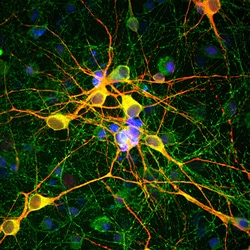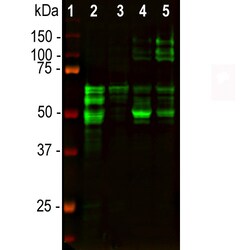Promotional price valid on web orders only. Your contract pricing may differ. Interested in signing up for a dedicated account number?
Learn More
Learn More
Invitrogen™ Tau Monoclonal Antibody (2E9)
Mouse Monoclonal Antibody
$526.00 - $1800.00
Specifications
| Antigen | Tau |
|---|---|
| Clone | 2E9 |
| Concentration | 1 mg/mL |
| Content And Storage | Store at 4°C short term. For long term storage, store at -20°C, avoiding freeze/thaw cycles. |
| Applications | Immunohistochemistry, Western Blot, Immunocytochemistry |
| Catalog Number | Mfr. No. | Quantity | Price | Quantity & Availability | |||||
|---|---|---|---|---|---|---|---|---|---|
| Catalog Number | Mfr. No. | Quantity | Price | Quantity & Availability | |||||
|
PIMA547306
|
Invitrogen™
MA547306 |
500 μL |
Each for $1,800.00
|
|
|||||
|
PIMA547404
|
Invitrogen™
MA547404 |
100 μL |
Each for $526.00
|
|
|||||
Description
Tau Monoclonal Antibody for Western Blot, ICC/IF, IHC
Tau is a neuronal microtubule-associated protein found predominantly on axons. The function of Tau is to promote tubulin polymerization and stabilize microtubules. The C-terminus binds axonal microtubules while the N- terminus binds neural plasma membrane components, suggesting that tau functions as a linker protein between both. Axonal polarity is predetermined by TAU/MAPT localization (in the neuronal cell) in the domain of the cell body defined by the centrosome. The short isoforms allow plasticity of the cytoskeleton while the longer isoforms may preferentially play a role in its stabilization. In its hyper-phosphorylated form, Tau is the major component of paired helical filaments (PHF), the building block of neurofibrillary lesions in Alzheimer's diseases (AD) brain. Hyper-phosphorylation impairs the microtubule binding function of Tau, resulting in the destabilization of microtubules in AD brains, ultimately leading to the degeneration of the affected neurons. Numerous serine/threonine kinases phosphorylate Tau, including GSK-3beta, protein kinase A (PKA), cyclin-dependent kinase 5 (cdk5) and casein kinase II. Hyper-phosphorylated Tau is found in neurofibrillary lesions in a range and other central nervous system disorders such as Pick's disease, frontotemporal dementia, cortico-basal degeneration and progressive supranuclear palsy.Specifications
| Tau | |
| 1 mg/mL | |
| Immunohistochemistry, Western Blot, Immunocytochemistry | |
| Unconjugated | |
| Mouse | |
| RUO | |
| PBS with 50% glycerol and 5mM sodium azide | |
| P10636, P10637, P19332, P29172 | |
| 100054638, 100738351, 17762, 281296, 29477, 4137 | |
| Recombinant full length 441 amino acid human tau. | |
| Antibody |
| 2E9 | |
| Store at 4°C short term. For long term storage, store at -20°C, avoiding freeze/thaw cycles. | |
| Monoclonal | |
| Liquid | |
| IgG1 κ | |
| Human, Mouse, Rat, Bovine, Pig, Horse | |
| MAPT | |
| AI413597; AW045860; DDPAC; FLJ31424; FTDP17; FTDP-17; G protein beta1/gamma2 subunit-interacting factor 1; map tau; Mapt; MAPTL; MGC138549; microtubule associated protein tau; microtubule-associated protein tau; microtubule-associated protein tau, isoform 4; microtubules; MSTD; Mtapt; MTBT1; MTBT2; Neurofibrillary tangle protein; neurofibrillary tangles; Neuronal Marker; paired helical filament-tau; PHFtau; PHF-tau; PPND; PPP1R103; protein phosphatase 1, regulatory subunit 103; pTau; RNPTAU; Tau; Tau microtubule-associated protein; tau protein; Tau-4; Tau5; Unknown (protein for MGC:134287) | |
| MAPT | |
| Primary | |
| Affinity chromatography |
Spot an opportunity for improvement?Share a Content Correction
Product Content Correction
Your input is important to us. Please complete this form to provide feedback related to the content on this product.
Product Title

